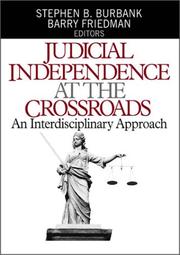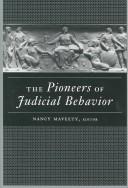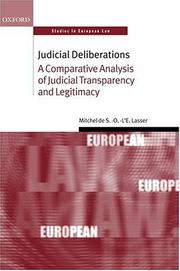| Listing 1 - 5 of 5 |
Sort by
|

ISBN: 0761926569 0761926577 1452229570 132241839X 1452262888 9781452262888 9781452229577 9780761926566 9781322418391 Year: 2002 Publisher: Thousand Oaks, CA : Sage Publications,
Abstract | Keywords | Export | Availability | Bookmark
 Loading...
Loading...Choose an application
- Reference Manager
- EndNote
- RefWorks (Direct export to RefWorks)
This book provides a path-breaking, interdisciplinary collection of essays by leading scholars on the contentious issues of judicial independence and federal judicial selection.
Judicial process --- Judicial power --- Judges --- Courts --- Processus judiciaire --- Pouvoir judiciaire --- Juges --- Tribunaux --- Judges - United States. --- Judicial power - United States. --- Judicial process - United States. --- Law - U.S. --- Law, Politics & Government --- Law - U.S. - General

ISBN: 1282437836 9786612437830 0472024205 9780472024209 9780472098224 0472098225 0472068229 9780472068227 Year: 2003 Publisher: Ann Arbor, Mich. University of Michigan Press
Abstract | Keywords | Export | Availability | Bookmark
 Loading...
Loading...Choose an application
- Reference Manager
- EndNote
- RefWorks (Direct export to RefWorks)
Examines the contributions of the "pioneers" of research into judicial behavior.
Electronic books. -- local. --- Judicial process -- United States. --- Procedure (Law) -- United States. --- Judicial process --- Law - U.S. --- Law - U.S. - General --- Law, Politics & Government --- United States --- Legal theory and methods. Philosophy of law --- United States of America --- Procedure (Law)
Book
ISBN: 9780674975811 0674975812 0674986091 0674986113 Year: 2018 Publisher: Cambridge (Mass.): Harvard university press,
Abstract | Keywords | Export | Availability | Bookmark
 Loading...
Loading...Choose an application
- Reference Manager
- EndNote
- RefWorks (Direct export to RefWorks)
Why do self-proclaimed constitutional “originalists” so regularly reach decisions with a politically conservative valence? Do “living constitutionalists” claim a license to reach whatever results they prefer, without regard to the Constitution’s language and history? In confronting these questions, Richard H. Fallon reframes and ultimately transcends familiar debates about constitutional law, constitutional theory, and judicial legitimacy. Drawing from ideas in legal scholarship, philosophy, and political science, Fallon presents a theory of judicial legitimacy based on an ideal of good faith in constitutional argumentation. Good faith demands that the Justices base their decisions only on legal arguments that they genuinely believe to be valid and are prepared to apply to similar future cases. Originalists are correct about this much. But good faith does not forbid the Justices to refine and adjust their interpretive theories in response to the novel challenges that new cases present. Fallon argues that theories of constitutional interpretation should be works in progress, not rigid formulas laid down in advance of the unforeseeable challenges that life and experience generate. Law and Legitimacy in the Supreme Court offers theories of constitutional law and judicial legitimacy that accept many tenets of legal realism but reject its corrosive cynicism. Fallon’s account both illuminates current practice and prescribes urgently needed responses to a legitimacy crisis in which the Supreme Court is increasingly enmeshed.
Political questions and judicial power --- Judicial process --- Constitutional law --- United States. --- Politique et pouvoir judiciaire --- Processus judiciaire --- Droit constitutionnel --- États-Unis. --- Political questions and judicial power - United States. --- Judicial process - United States. --- Constitutional law - United States. --- Etats-Unis --- Cynical realism (Law)

ISBN: 1282423436 9786612423437 0472022636 9780472022632 047208335X 0472106708 9780472083350 9780472106707 0472060708 9780472060702 Year: 1997 Publisher: Ann Arbor University of Michigan Press
Abstract | Keywords | Export | Availability | Bookmark
 Loading...
Loading...Choose an application
- Reference Manager
- EndNote
- RefWorks (Direct export to RefWorks)
How do we explain judges' decisions?
Electronic books. -- local. --- Judicial process -- Psychological aspects. --- Judicial process -- Social aspects. --- Judicial process -- United States. --- Political questions and judicial power -- United States. --- Judicial process --- Political questions and judicial power --- Law - U.S. - General --- Law - U.S. --- Law, Politics & Government --- Decision making, Judicial --- Judicial behavior --- Judicial decision making --- Judges --- Law --- Procedure (Law) --- Judicial activism --- Judicial power and political questions --- Act of state --- Administrative discretion --- Judicial review --- Jurisdiction --- Rule of law --- Separation of powers --- Social aspects --- Psychological aspects --- Interpretation and construction --- Political aspects --- Social aspects. --- Psychological aspects.

ISBN: 9780199575169 9780199274123 0199575169 1306134854 0199274126 Year: 2004 Publisher: Oxford: Oxford university press,
Abstract | Keywords | Export | Availability | Bookmark
 Loading...
Loading...Choose an application
- Reference Manager
- EndNote
- RefWorks (Direct export to RefWorks)
Judicial Deliberations compares how and why the European Court of Justice, the French Cour de cassation and the US Supreme Court offer different approaches for generating judicial accountability and control, judicial debate and deliberation, and ultimately judicial legitimacy. Examining the judicial argumentation of the United States Supreme Court and of the French Cour de cassation, the book first reorders the traditional comparative understanding of the difference between French civil law and American common law judicial decision-making. It then uses this analysis to offer the first detailed comparative examination of the interpretive practice of the European Court of Justice. Lasser demonstrates that the French judicial system rests on a particularly unified institutional and ideological framework founded on explicitly republican notions of meritocracy and managerial expertise. Law-making per se may be limited to the legislature; but significant judicial normative administration is entrusted to State selected, trained, and sanctioned elites who are policed internally through hierarchical institutional structures. The American judicial system, by contrast, deploys a more participatory and democratic approach that reflects a more populist vision. Shunning the unifying, controlling, and hierarchical French structures, the American judicial system instead generates its legitimacy primarily by argumentative means. American judges engage in extensive debates that subject them to public scrutiny and control. The ECJ hovers delicately between the institutional/argumentative and republican/democratic extremes. On the one hand, the ECJ reproduces the hierarchical French discursive structure on which it was originally patterned. On the other, it transposes this structure into a transnational context of fractured political and legal assumptions. This drives the ECJ towards generating legitimacy by adopting a somewhat more transparent argumentative approach.
Judicial process --- Processus judiciaire --- France. --- United States. --- Court of Justice of the European Communities. --- -Judicial process --- -347.012094 --- Me1 --- Decision making, Judicial --- Judicial behavior --- Judicial decision making --- Judges --- Law --- Procedure (Law) --- Psychological aspects --- Interpretation and construction --- France. -- Cour de cassation. --- Judicial process -- European Union countries. --- Judicial process -- France. --- Judicial process -- United States. --- United States. -- Supreme Court. --- Law, General & Comparative --- Law - Europe, except U.K. --- Law - Non-U.S. --- Law, Politics & Government --- Judicial assistance. --- Supreme Court (U.S.) --- Chief Justice of the United States --- Supreme Court of the United States --- Judicial assistance --- Civil procedure --- Criminal procedure --- Judgments, Foreign --- Cour de justice des communautés européennes --- Gerichtshof der Europäischen Gemeinschaften --- Corte di giustizia delle comunità europee --- Dikastērion tēs Europaikēs Oikonomikēs Koinotētos --- Hof van Justitie van de Europese Gemeenschappen --- Tribunal de Justicia de las Comunidades Europeas --- GHEG --- European Atomic Energy Community. --- European Economic Community. --- European Court of Justice --- Europäischer Gerichtshof --- Curtea de Justiție a Comunităților Europene --- Ōshū Shihō Saibansho --- G.H.E.G. --- Tribunal de Justiça das Comunidades Europeias --- Sud evropeĭskikh soobshchestv --- Avrupa Toplulukları Adalet Divanı --- Tribunal de Justiça das Comunidades --- Curia Communitatum Europaearum --- Eurōpaiko Dikastērio --- Dikastērio Eurōpaikōn Koinotētōn --- DEK --- EuGH --- ECJ --- D.E.K. --- Europejski Trybunał Sprawiedliwości --- ETS --- Dikastērio tōn Eurōpaikōn Koinotētōn --- CEJ --- European Union. --- European Coal and Steel Community. --- Court of Justice of the European Union --- 美國. --- Court of Justice of the European Communities --- Európai Bíróság --- Judicial process - European Union countries --- Judicial process - France --- Judicial process - United States --- DROIT JUDICIAIRE COMPARE --- Cour suprême --- COMMON LAW --- COUR DE CASSATION --- Cour de justice des Communautés européennes --- Etats-Unis --- FRANCE --- question préjudicielle
| Listing 1 - 5 of 5 |
Sort by
|

 Search
Search Feedback
Feedback About UniCat
About UniCat  Help
Help News
News